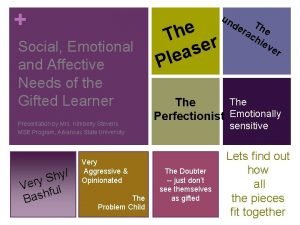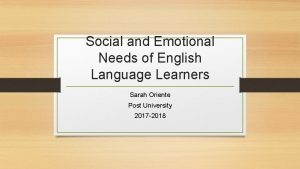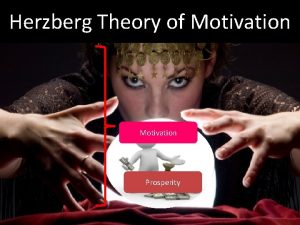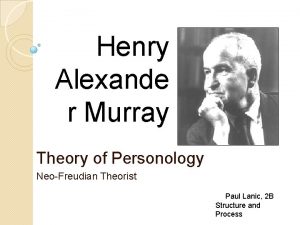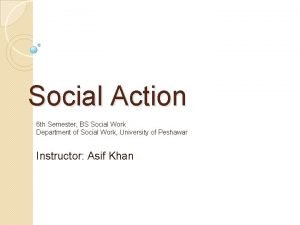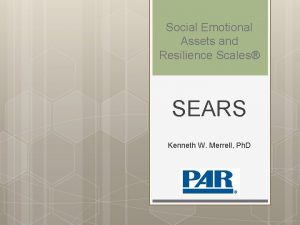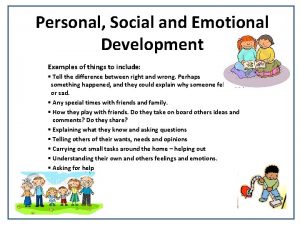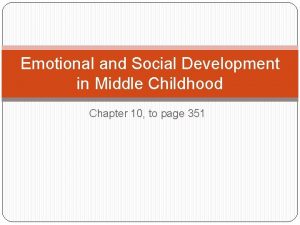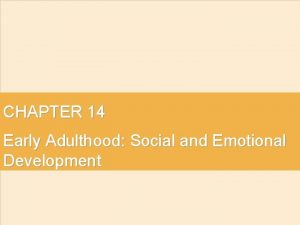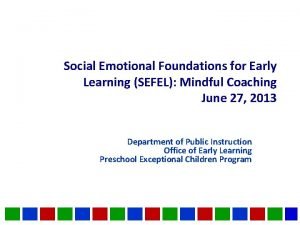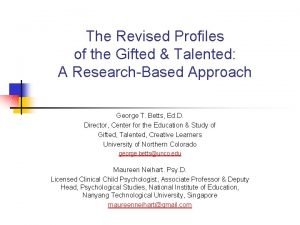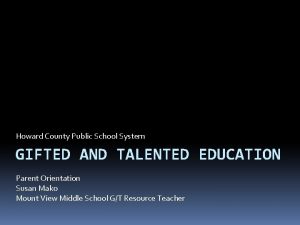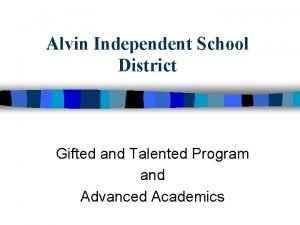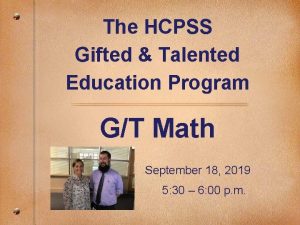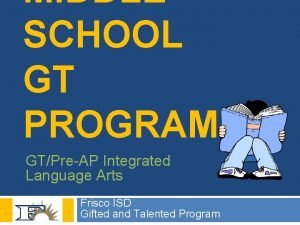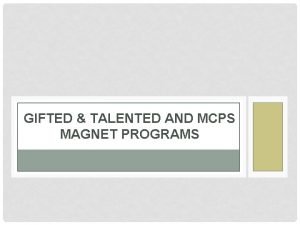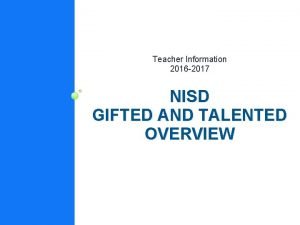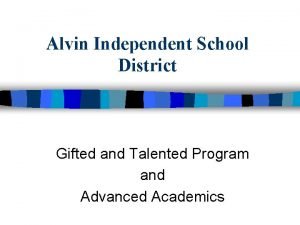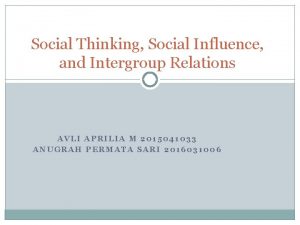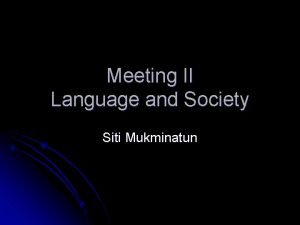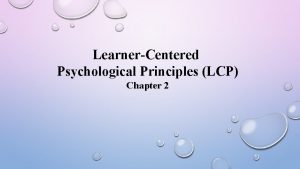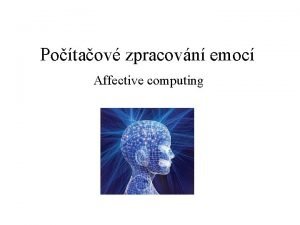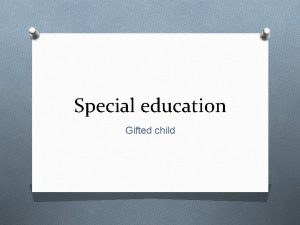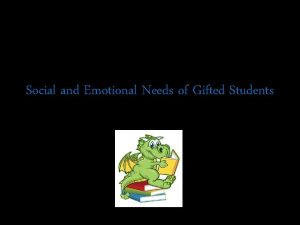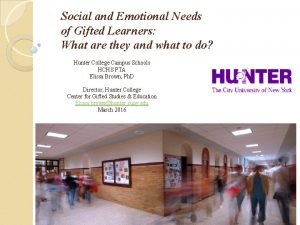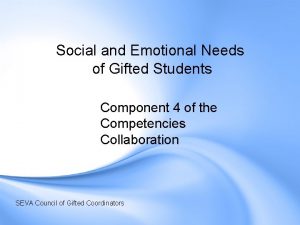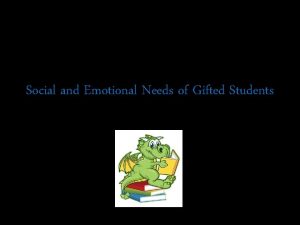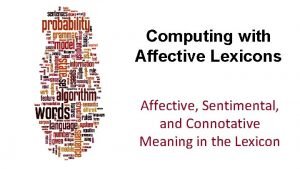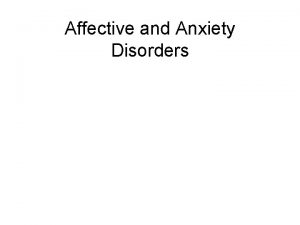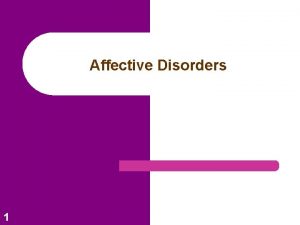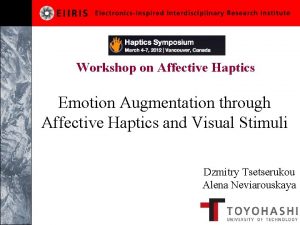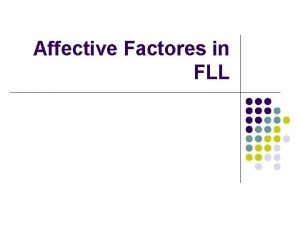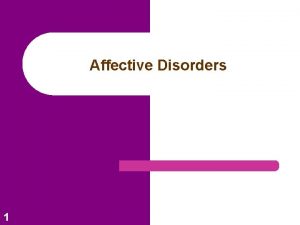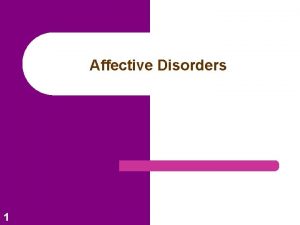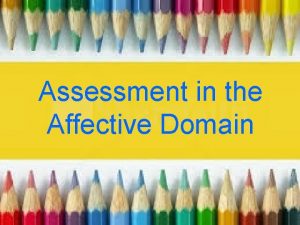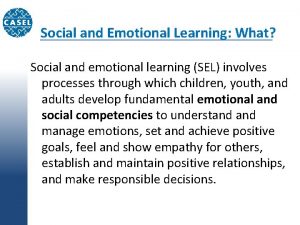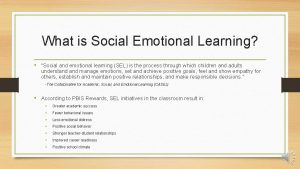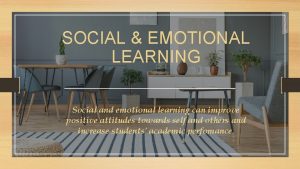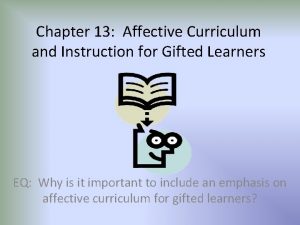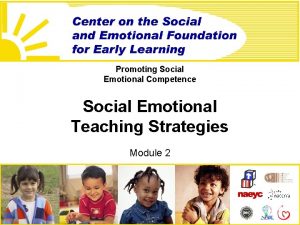Social Emotional and Affective Needs of the Gifted
































- Slides: 32

+ Social, Emotional and Affective Needs of the Gifted Learner Presentation by Mrs. Kimberly Stevens MSE Program, Arkansas State University y/ h S Very ul f h s a B Very. A V Aggressive op ggr er & in es y Opinionated io si na ve te / d The Problem Child e h T r e s a e l P un d er The ac hie v er The Perfectionist Emotionally sensitive The Doubter -- just don’t see themselves as gifted Lets find out how all the pieces fit together

+ Before we continue it’s important to clarify what giftedness is and why they have need of affective education, so we’ll take a look at. . . n The Definition of Giftedness (U. S. Department of Education) Gifted learners are children and youth with outstanding talent who perform or show the potential for performing at remarkably high levels of accomplishment when compared with others of their age, experience, or environment. Gifted and Talented are those identified by professionally qualified persons who, by virtue of outstanding abilities, are capable of high performance. These children require differentiated educational programs and or services beyond those normally provided by the regular school program in order to realize their contribution to self and society.

More important definitions of + Giftedness This one is by Sidney Marland—U. S. Commissioner of Education n Children capable of high performance include those with demonstrated achievement and or potential ability in any of the following areas, singly or in combination; n General intellectual ability n Specific academic aptitude n Creative or Productive thinking n Leadership ability n Visual and Performing Arts

+ Next let’s take a deeper look At further evidences that point to the Affective Needs of the Gifted

+ Social Interactions School years can be difficult but the more they know themselves the easier it can be. n Self concept n Kids need opportunities to describe themselves n Kids need the chance to say what they like and what they don’t like n They need to reflect on what is easy for them and what they find difficult. n They should have a format from which to tell what they want to do with their life. n They need to reflect on the things they value and why.

+ Learning about self n They should have a format from which to tell what they want to do with their life. n They need to reflect on the things they value and why. We often heavily focus on these issues at the beginning of the school year, when we look at and study diverse learning styles. We use the following free online assessment found at Learning. Styles-Online. com

+ Fitting In—Peer Group Interactions n As we grow up, we all want to fit in with our peers and often that means blending in with the group. n What happens when kids and their peers notice that there are some big differences between them? Often the gifted child feels left out, ridiculed, rejected, or even estranged from their peer group. n Differences in how they learn/quickly, think/differently, reason/logically, and plan/strategically can easily offset them from their peers. Additionally, it could be that the child finds some tasks are accomplished very easily while other tasks they find are quite a bit more difficult, causing them confusion and self-doubt. These are all reasons why the gifted child has very real need for Affective development. n The current slide depicts some of the affective activities gifted learners engage in throughout the school year in an effort to develop their self-concept and metacognitive abilities. n This is why gifted students need opportunities to get to know themselves, their learning styles, their values, as well as the perspectives of their gifted peers. Then they recognize they aren’t the only ones with these experiences and that they don’t have to be great at everything!

e n i m a x e s l c l i ’ t e s i r w e , t t c x a e r N a h C s u t o a i r h t va s t i a r t r o e l d p n o a e p t p o l + differen e v e d y l t n e r e inh And we’ll examine the common negative effects that typically accompany these various characteristics and the affective lessons that aid each character in achieving their maximum potential

+ Gifted kids are cut from diverse cloths—not just beige.

+ Please r Pleasers want ü to do great work ü to make teachers happy ü to make parents happy ü They love to help and care deeply about what peers and authority figures think of them.

They are not always this easy to spot but are usually angry inside and often feel misunderstood. + They have the ability but not the desire or drive. They operate on the “Why bother? ” mentality. The underachiever Unde rachi evem e C Affec ommon nt is ting 2 Of gi 0% to 50% fted d kid s

+ The Perfectionist ² Has to score an A on everything! ² Must have the top recognition in whatever the competition. ² Can not handle failure. ² Hinges their self worth on their successes

+ The Emotionally sensitive Easily cry and get very upset over certain topics; ethical issues, world problems, unfair judgments, animal rights issues, humanitarian issues, environmental issues, etc. , (problems beyond their control)

+ The Doubter These students are sure that some how a mistake has been made in the identification process. Down deep they can’t accept that they are gifted and feel that if people knew how many areas there are that they struggle in—they wouldn’t think they were gifted at all.

+ The Problem Child v Often exhibit DISRUPTIVE behavior. Can be a real pest! v Often becomes board with routine assignments. They are restless, inattentive, distracts others for entertainment and frequently lack common social skills. v They are frequently very outspoken, critical of both themselves and others, an attitude which often alienates adults as well as peers. v They often want to do things his or her own way and may not regard directions.

+ Other traits that frequently cause a gifted child to be overlooked. . . u Poor spelling u Careless handwriting u Inaccurate answers in Math (because they are impatient with details requiring rote learning or drill. ). u Lack of organizational skills u Day Dreamers u Poor listeners

+ Very Shy & Bashful We have all met those intensely shy children, but sometimes it takes more than just time to help them out grow their bashfulness.

+ The one personality trait that all scholars who specialize in the identification of giftedness agree upon is “tolerance of ambiguity” (Golann, 1963). Ambiguity of information, in words, pictures, or other media, is the ability to express more than one interpretation. It is generally contrasted with vagueness, in that specific and distinct interpretations are permitted (although some may not be immediately apparent), whereas with information that is vague it is difficult to form any interpretation at the desired level of specificity. http: //en. wikipedia. org/wiki/Wikipedia

+ Career Directions Recurring Themes in Career Counseling of Gifted and www. gifted. uconn. edu/nrcgt/newsletter/spring 02/sprng 022. html by MJ Greene Cited by 5 - Related articles In this review of literature, some research-based and some not, recurring themes in career counseling for gifted and talented students are presented for … Gifted Adrift? Career Counseling of the Gifted and Talented www. tandfonline. com/doi/abs/10. 1080/02783190309554201 by MJ Greene 2003 - Cited by 35 - Related articles Research on career development and counseling for gifted and talented students. . . Career Planning for Gifted and Talented Youth. ERIC Digest This digest addresses some of the special career planning needs of gifted and talented students and offers intervention guidelines for the elementary, junior. . . www. ericdigests. org/1994/career. htm - 32 k - Cached Scholarly articles for career counseling gifted Counseling the gifted and talented. - Silverman - Cited by 409 Basic issues and concepts in career counseling for … - Betz - Cited by 183 Counseling Uses of Career Self‐Efficacy Theory - Betz - Cited 161 by. . . digest provides students, parents, and educators with guidelines to help gifted students in the college planning process. As learning about oneself and career. . . www. thememoryhole. org/edu/eric/ed 321495. html - 19 k - Cached NAGC - ED Career Planning for Gifted and Talented Youth award competition scholarship student lucent science international high school seniors math cash scholarship. . . A longitudinal study of gifted students. . www. nagc. org/index. aspx? id=202 - 34 k – Cached

+ As you can see, with the variety of characters that exist, gifted individuals are found within each one of them. There is no, one set cloth from which a gifted child is formed. Some teachers may think they are mostly beige, but let me tell you. Gifted kids can come in every array of fabric imagined, plaid, rainbow striped, zebra print —you name it. My point is to help you see that part of the Affective needs of a gifted learner, may just be not only learning to live successfully with their stripes but making the stripes work for them!

+ Before we conclude this presentation on Affective Needs, I would be remiss if I didn’t address the very sobering topic of Suicide.

+ n Suicide is the third leading cause of death among 15 -24 year olds! There are many signs of helplessness, hopelessness, and depression! Suicide n What It’s not just an adult problem. n Talk n Be can I do? freely and calmly a good listener n Help him/her feel worthwhile & wanted n Counseling from professionals

+ More About Suicide If ever confronted with a teen who is contemplating suicide, there are some key things to know and specific things you should never do; Never be afraid to mention suicide Never leave him or her alone Never wait to see if more signs develop Never bring religious paradigms into the conversation Never make light of the situation by saying “Everything will be fine” rather be credible and say, “These are some tough issues to work through, but you can do it. ” Never be judgmental Never argue about the value of life

+ Suicide—What to do next Suicide continued—What to do next if you discover a student is contemplating it: n. Involve health care professionals that day. n. Drive them to where they can receive help. n. If you are not the parent, get parents involved. n Seek out counseling services and get a plan established

+ Additional Resources On the web

+Web Sites regarding Affective Needs of the Gifted SENG: Supporting Emotional Needs of the Gifted www. sengifted. org/ 10 Social & Emotional Needs of the Gifted www. byrdseed. com/10 -facts-about-socialemotionalneeds-. . . NAGC - NAGC Position Statements: Addressing Affective Needs www. nagc. org/index. aspx? id=384 Emotional Needs of the Gifted www. educationoasis. com/resources/. . . / emotional_needs_ gifted. htm Addressing the Affective Needs of Gifted Children | Education. com www. education. com ›.

+ t n e r a P t n e m e v l o Inv Suggested Web sites How to Support Your Gifted Child's Education - Parent Involvement. . . www. parentinvolvement matters. org/articles/giftedness. html Apr 2, 2011 –Gifted students need parental involvement and support too! This article describes the characteristics of gifted learners, provides examples of the … Parent Involvement | Gifted & Talented giftedtalented. durangoschools. org/parent-involvement Parent involvement is a key component to student success, and Durango 9 -R strives to encourage that involvement in order to create a team-approach to a. . . Parental involvement in gifted education Springer. Link www. springerlink. com/index/gr 62714555714348. pdf by B Tao - 1986 Cited by 3 Related articles BILLY TAo. PARENTAL INVOLVEMENT IN GIFTED EDUCATION. INTRODUCTION. Terence Tao is the oldest of three children. His exceptional mathematical … Parental involvement in the academic and social lives of. . . www. davidson gifted. org/db/Articles_id_10038. aspx Nov 14, 2012 – This book chapter is about a study that was done on parental

+ Great Web Video Clips that expand on this subject area n http: //www. youtube. com/watch? v=MD Jst-y_pt. I&feature=related n affective gifted pinterest. com/pmbronn/affecti ve-gifted/ 10 social & emotional needs of gifted students. 4 likes 6. . . A bunch of short video clips of students giving pointers about surviving in middle school! Fantasitc! Professional Development Outreach Series Videos. Title. . . cognitive and affective characteristics of gifted and. . . the affective needs of gifted students. Learn to … n Gifted-Spirit. www. gifted-spirit. com/ Established by a parent who was recognized as an educational success story [ CNN Perry's. . . Com supports education and parental involvement through an online. . . Tele-classes & Tele-conferences for Parents; Video clips for potential/ gifted … n Gifted Education - Cleveland Metropolitan School District www. cmsdnet. net/Departments/Academics. Dept/. . . /Gifted. aspx In order to maintain academic rigor and the social-emotional well-being of our gifted children, parent involvement is a major component of our program. n Gifted Education - Dayton Public Schools www. dps. k 12. oh. us/students-andparents/gifted -education. html Teacher; Parent; Self; Peer; Counselor; School Psychologist; Administrator; Gifted Services Representative; Curriculum Specialist; Other adult familiar with. . .

Suggested web sites that have information and tips on dealing with underachievement Hoagies' Gifted: Gifted Underachievement www. hoagiesgifted. org/underachievement. htm Mar 30, 2012 – Gifted Underachievement: what is it, and what can we do about it? + Hoagies' Gifted: Gifted Underachievement Gifted underachievers are usually lumped in with the rest of a school's malcontents. . The Gifted Underachiever - Marching to a Different Drummer? . . . www. hoagiesgifted. org/underachiever. htm - 64 k - Cached Underachieving Gifted Students giftedkids. about. com/od/schoolissues/a/underachieving. htm by Carol Bainbridge - in 147 Google+ circles - More by Carol Bainbridge There is perhaps no situation more frustrating for parents or teachers than living or working wi children who do not perform as well academically as their. . . Understanding Underachievement in Gifted Children giftedkids. about. com ›. . . Underachievement › and Motivation by Carol Bainbridge - in 147 Google+ circles - More by Carol Bainbridge Parents ofgifted children are often surprised and dismayed when their children underachieve in school. The key to helping an underachiever succeed is. . . Meeting the needs of gifted underachievers – individually! www. davidson gifted. org/db/Articles_id_10442. aspx This article by Joan Smutney, lists the common characteristics of gifted underachievers, addresses some of the "most promising" solutions to underachievement … -l

+ Professional References Golann, S. E. (1963). Psychological study at creativity. Psychological Bulletin, 60, 548 -565. Johnson, Karen. (2001). Integrating an affective component in the curriculum for gifted and talented students. (Gifted Child Today), 24(4), 14 -18. Milligan, Julie Lamb. (2012). Assessment of giftedness a concise and practical guide. 2 nd edition. YBK publishers, New York.

+ Questions?

Thank you for your attendance. For More Information on this and other topics regarding the Needs of the Gifted and Talented Please contact; + Mrs. Kimberly Stevens, Trumann School District Gifted and Talented Coordinator/Facilitator 1200 Cedar Street Trumann AR, 72472 Phone: 870 -483 -5413 Email: kimberly. stevens@trumannwildcat. com
 Affective needs of gifted students
Affective needs of gifted students Social emotional needs of ell students
Social emotional needs of ell students Affective curriculum
Affective curriculum Primary needs and secondary needs
Primary needs and secondary needs Satisfaction
Satisfaction Alpha press murray
Alpha press murray Strategic gender needs and practical gender needs
Strategic gender needs and practical gender needs Types of needs analysis in esp
Types of needs analysis in esp Affective social action example
Affective social action example Sears assessment
Sears assessment Fictional character examples
Fictional character examples Middle childhood emotional development
Middle childhood emotional development Social development middle adulthood
Social development middle adulthood Early adulthood emotional development
Early adulthood emotional development Social and emotional wellbeing framework
Social and emotional wellbeing framework Social and emotional foundations for early learning
Social and emotional foundations for early learning Socioemotional development in late adulthood
Socioemotional development in late adulthood Betts neihart profiles of the gifted and talented
Betts neihart profiles of the gifted and talented Gifted and remedial
Gifted and remedial This institution is for gifted students in the philippines
This institution is for gifted students in the philippines Howard county gifted and talented
Howard county gifted and talented Alvin isd gifted and talented
Alvin isd gifted and talented Hcpss 4th grade math
Hcpss 4th grade math Frisco gt traing programs
Frisco gt traing programs Howard county gifted and talented
Howard county gifted and talented Https://bit.ly/mcps-parentinput
Https://bit.ly/mcps-parentinput The anderson school gifted and talented nyc
The anderson school gifted and talented nyc Nisd gifted and talented program
Nisd gifted and talented program Alvin isd gifted and talented
Alvin isd gifted and talented Apa itu social thinking
Apa itu social thinking Social thinking social influence social relations
Social thinking social influence social relations Status scale in sociolinguistics
Status scale in sociolinguistics 14 psychological principles of learning
14 psychological principles of learning
